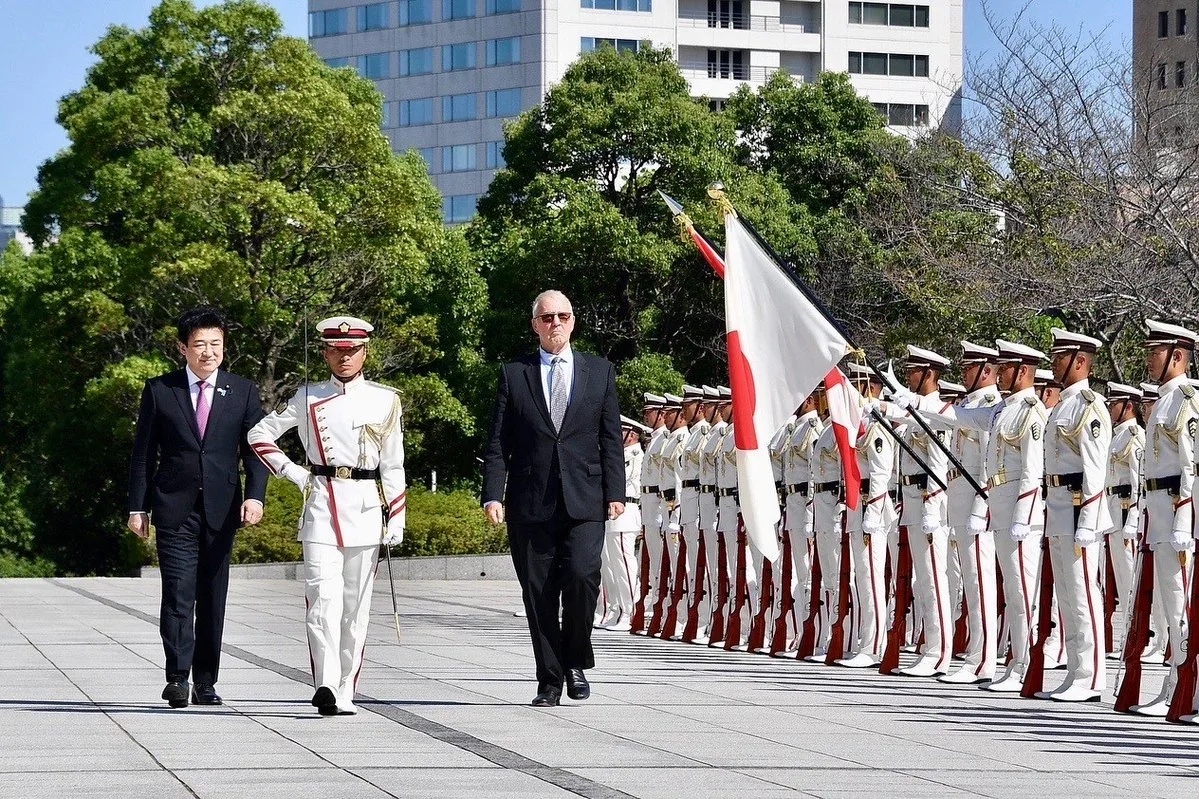Tokyo – Bill Blair, Minister of National Defence, concluded a successful visit to the Republic of Korea (ROK) and Japan.
In the Republic of Korea, Minister Blair visited the Korean Demilitarized Zone (DMZ) on September 9 and met with Canadian Armed Forces (CAF) personnel serving with the United Nations Command (UNC), including its Deputy Commander, Lieutenant-General Derek Macaulay.
Minister Blair also attended a ROK-hosted Industry Cooperation Showcase event, where he welcomed progress on that country’s procurement of approximately 40 Canadian-built Bell 505 helicopters. These helicopters, which are built in Mirabel, Quebec, have been selected as the ROK’s new Army and Navy trainer helicopter. Minister Blair also met with ROK Deputy Minister of Defense Sung Il to discuss opportunities for further industrial collaboration.
At a working dinner with the Defence Minister of the Netherlands, Ruben Brekelmans, the Ministers discussed the work that both nations are doing to support Ukraine, including its F-16 capability.
On September 10, Minister Blair addressed the Responsible Artificial Intelligence in the Military Domain Summit. The minister endorsed the Summit’s Blueprint for Action, whose pursuit is the responsible military application of AI. He also participated in a roundtable discussion with other Defence Ministers and reiterated Canada’s commitment to responsible AI, which was outlined in the DND/CAF AI Strategy released earlier this year.
Along with his Korean counterpart Kim Yong-hyun, Minister Blair co-hosted the second annual ROK-United Nations Command Member Countries Defence Ministerial Meeting. The minister reaffirmed Canada’s commitment to maintaining peace on the Korean Peninsula through an enduring presence as part of the UNC. Canada has been persistently present on the Peninsula since the Korean War, in which more than 26,000 Canadians fought.
On September 11, Minister Blair addressed the Seoul Defence Dialogue, where he condemned the Democratic People’s Republic of Korea’s (DPRK) nuclear and ballistic missile programs, and its growing military cooperation with Russia, which fuels its war on Ukraine and poses a threat to security in the Indo-Pacific. The Minister also expressed concern at China’s efforts to undermine freedom of navigation in the South China Sea, including its dangerous and destabilizing actions against Philippine vessels.
On the same day, Minister Blair held a bilateral meeting with ROK Defence Minister Kim Yong-hyun. He also engaged with Defence Minister Antti Häkkänen of Finland, Defence Minister Mohamed Khaled Nordin of Malaysia and Defence Minister Byambatsogt Sandag of Mongolia.
The minister also laid wreaths at the Canadian Embassy’s Stone Garden and the Korean War Memorial, in memory of the 516 Canadians who lost their lives in the Korean War.
In Japan on September 12, the Minister met with the ambassadors of G7 and Five Eyes countries at the Canadian Embassy. He also received a briefing from the Enforcement Coordination Cell (ECC) Deputy Commander, Cdr Lucas Kenward. The ECC monitors the DPRK’s illicit activities and coordinates partner nation actions at sea and in the air to track, disrupt, and deter those illicit activities.
Later that day, Minister Blair addressed a reception at the Embassy of Ukraine to mark Ukrainian Independence Day and met with Ukraine’s Ambassador to Japan, Sergiy Korsunsky.
On September 13, Minister Blair met with Japan’s Minister of Defence, Kihara Minoru to discuss defence and security challenges in the Indo-Pacific region, operational cooperation between Canada and Japan, and progress on initiatives under the Canada-Japan Action Plan for contributing to a free and open Indo-Pacific region.
Ministers Blair and Kihara welcomed the growing cooperation between our countries’ militaries. This summer, the Royal Canadian Navy (RCN) and the Japan Maritime Self-Defence Force participated in the US-led Exercise PACIFIC VANGUARD alongside the ROK and US navies. In addition to engaging in high-end warfighting scenarios to enhance their skills and interoperability in maritime, anti-submarine and air operations, PACIFIC VANGUARD is an opportunity for like-minded nations to strengthen personal and professional relationships with some of our closest partners. Most recently, from September 6-8, the RCN and the Japan Maritime Self-Defense Force conducted Exercise KADEX in the Timor Sea, which focused on strengthening interoperability between our two navies.
Minister Blair announced that from September to October 2024, Canada will deploy a Royal Canadian Air Force (RCAF) CP-140 Aurora Air Detachment to Japan under Operation NEON, which is the Canadian Armed Forces (CAF) contribution to the multinational effort to monitor the United Nations Security Council (UNSC) sanctions imposed against the DPRK.
For a period of approximately four weeks, the CP-140 Aurora will monitor for suspected maritime sanctions evasion activities, in particular ship-to-ship transfers of fuel and other commodities banned by the UNSC. The RCAF CP-140 Aurora Air Detachment consists of approximately 50 personnel.
As a Pacific nation, Canada remains committed to the security and stability of the Indo-Pacific region, and will continue to boost its defence relationships with key partners like the Republic of Korea and Japan.
“Canada is a Pacific nation, and the security and prosperity of the Indo-Pacific region are vital to Canada’s future. Our growing military presence in the region demonstrates our commitment to supporting a free, open, and inclusive Indo-Pacific. Together with our key partners, including the Republic of Korea and Japan, we will continue to strengthen our defence relationships in the region.” – Bill Blair, Minister of National Defence








